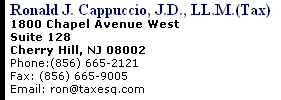|

Tax Court
Cases
As a tax attorney since 1976,
admitted to practice before NJ State and Federal Courts, including
the US Tax Court and the Court of Federal Claims, I have helped
clients from around the U.S. as well as multi-national clients. Tax
Court cases can be particularly challenging because of the
long delays. The advantage is you get a court and judge with tax law
expertise.
After you filed a petition in Tax Court, the Court served the
IRS. The IRS Answer is due 60 days thereafter, although
sometimes the government will request an extension from the
Court.
The IRS attorneys almost always file their answers at the very
end of the 60 day period for the simple reason that it usually takes
them that long to get possession of the file. And then they
file a very uninformative answer (sort of like a general denial)
because they know very little about the case and have very little
time in which to become familiar with the file. They only
thing useful you are likely to learn from the answer is the name of
the attorney assigned to the case.
The IRS attorney will usually be sending the file to
Appeals immediately after the answer is filed. The
transfer process is very slow. It may be months before you are
contacted by Appeals for settlement conference scheduling. You
might consider being proactive and contacting Appeals to find out
who at Appeals the case has been assigned to. That person will
want to schedule a settlement/discovery conference as late as
possible. You might want to urge some speed. Good luck
in that regard. Both the IRS attorneys and the Appeals
Officers tend to go very slowly on cases unless a trial date is
pending.
If the case has not been previously reviewed by
Appeals (and sometimes even if it has), Counsel will normally allow
Appeals to attempt to settle the case. If you want Appeals
consideration, you should request it.
After the Answer is
filed, you must make a good faith effort to exchange information
informally (the Branerton conference) and stipulate to facts that
will not be in dispute at trial. Thereafter, and to the extent
that the informal discovery was not provided, you may engage in
formal discovery. The Tax Court Rules regarding discovery
differ significantly from the federal rules.
Unless
prodded by a motion from one of the parties (e.g. a motion for
summary judgment), the Tax Court will not get involved in the
process until the matter is set for trial. The Tax Court will
send a Notice of Trial about five months prior to the trial calendar
in the location designated on the place of trial. As well as
setting a time for the trial of factual issues in the case, this
Notice will also set many deadlines (last day for discovery,
etc.). Unless the legal issues are very simple, the court will
ask the parties to address the legal issues in post-trial briefs.
 | 


















































